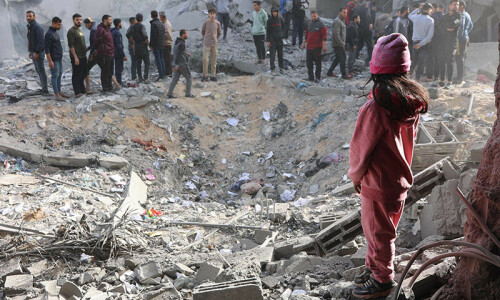BRUSSELS: Turkey would help stem the flow of migrants to Europe in return for cash, visas and renewed talks on joining the EU in a deal struck on Sunday.
Leaders of the 28 European Union states met Turkish Prime Minister Ahmet Davutoglu in Brussels on Sunday evening to give their collective political blessing to an agreement hammered out by diplomats over the past few weeks.
A spokesman for summit chairman Donald Tusk, the European Council president, said a joint statement had been agreed. He gave no details but a draft seen earlier in the day by Reuters was in line with proposals discussed in the past few days.
A key element is $3.2 billion in EU aid for the 2.2 million Syrian refugees in Turkey, intended to raise living standards and so persuade more to stay put rather than attempt the perilous crossing to the Greek islands and the EU.
EU to provide $3.2bn to improve livelihood of 2.2m Syrians now living in Turkey
Also on offer to Ankara, which has driven a hard bargain but also wants to revive relations with its European neighbours as it faces trouble in the Middle East and from Russia, is a “re-energised” negotiating process on Turkish membership of the EU — even if few on either side expect it to join soon.
And many Turks could also benefit from visa-free travel to Europe’s Schengen zone within a year if Turkey meets conditions on tightening its borders in the east to Asian migrants and moves other benchmarks on reducing departures to Europe.
“Today is a historic day in our accession process to the EU,” Davutoglu told reporters on arrival for the summit. “I am grateful to all European leaders for this new beginning.”
Aware of a sense of desperation in Europe for a solution to a crisis that has called into question its own cohesion and the future of its Schengen passport-free travel zone, Turkish President Tayyip Erdogan has driven a hard bargain.
Diplomats said the 28 EU governments had struggled through Saturday to agree a final offer.
The deal involves Turkish help, including through naval patrols and border checks, in handling the flow of migrants to the EU, expected to reach 1.5 million people this year alone, and the EU offering cash and restarting talks on EU accession.
“Both sides will ... with immediate effect, step up their active cooperation on migrants ..., preventing travel to Turkey and the EU, ensuring ... readmission provisions and swiftly returning migrants who are not in need of international protection to their countries of origin,” read a draft of the agreement.
Summit chairman Tusk stressed that the meeting was primarily about migration rather than improving Turkish ties, which have been strained in recent years as Erdogan has used a powerful electoral mandate to consolidate his power.
“Our main goal is to stem the flow of migrants to Europe,” Tusk said.
The Europeans, none more so than German Chancellor Angela Merkel, are under pressure to manage the biggest influx of people since World War Two, the bulk of them to Germany. The crisis has helped populist opponents and set nations against each other, straining the open borders of the EU.
“We will agree on the EU-Turkey action plan today,” Merkel said on arrival. “One main part of this EU-Turkey action plan will be how we can replace illegal migration by legal migration, how we can improve the situation of refugees within Turkey.”
Measures the EU has taken in recent months have done little to control migrant movements. While winter weather may lower the numbers for a few months, it is also worsening the plight of tens of thousands stuck by closing borders in the Balkans.
Sunday’s summit, called just days ago as Brussels tried to clinch a deal offered over a month ago, has been complicated by Turkey’s downing of a Russian warplane on the Syrian border.
That has complicated European efforts to re-engage with Moscow, despite a continued frost over Ukraine, in order to try to advance a peace in Syria that could end the flight of refugees and contain the militant Islamic State group.
Published in Dawn, November 30th, 2015











































